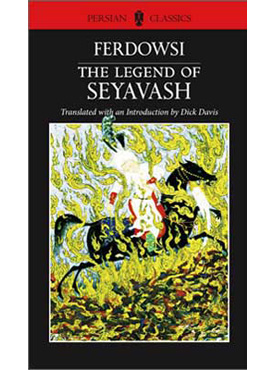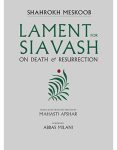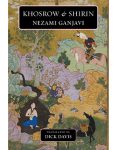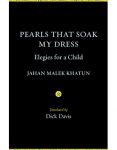About the Book
The Legend of Seyavash comes from the middle section of the Shahnameh, Iran’s national epic by the poet Ferdowsi (c 940–c 1020) and presents a world of warfare, military prowess, romance, guile, and fierce tribal loyalty. Ferdowsi’s epic style and mastery of poetic organization, however, is matched by the psychological and ethical depth of his insight and his concerns for the primal struggle between good and evil, and man’s continual attempt to create justice and civilized order out of the chaos of human greed and cruelty. The Legend of Seyavash begins with the stuff of romance—a foreign girl of royal blood, found as a fugitive and introduced into the king’s harem, gives birth to a son, Seyavash, who is raised not by his father the king, but by the great hero Rostam. On Seyavash’s return home Sudabeh, his step-mother, attempts to seduce him, and when he spurns her she accuses him of having attempted to rape her. He undergoes a trial by fire to prove his innocence, and goes on to battle successfully against Iran’s rival, Turan, concluding a truce with the Turanian king, Afrasyab, on amicable terms. But Seyavash’s father, Kavus, insists that Seyavash surrender the Turanian hostages to slaughter, and with a conflicted conscience and no one to turn to, Seyavash flees to the Turanian court, where he is first given safe harbor, but is once again abandoned. Dick Davis has made a masterful translation of the poem and written a penetrating introduction.
Reviews
put content here
Excerpt
Table of Contents
- Introduction ix
- List of Characters xxix
- The Legend Of Seyavash 1
- The Beginning of the Story 2
- Seyavash’s Letter to Kavus and Rostam’s Journey 46
- Kavus’s Answer to Seyavash 51
- Afrasyab’s Letter to Seyavash 59
- Seyavash Shows His Skills before Afrasyab 68
- How Piran and Seyavash Became Related 72
- How Afrasyab and Seyavash Became Related 78
- Garsivaz Visits Seyavash 90
- Seyavash Writes a Letter to Afrasyab 106
- Seyavash is Killed 117
- The Birth of King Kay Khosrow 122
- Translator’s Afterword 131
- Notes 133
———-
The Legend Of Seyavsh
- And now, o expert story-teller, make
- A well-turned narrative for us; whenever
- A poet’s words conform to wisdom’s ways
- His spirit brings us comfort (while the man
- Whose thoughts are ugly finds his purposes
- Spoilt by that ugliness, he crucifies
- Himself and is a laughing-stock to those
- Who understand; though no man sees his own faults,
- You think your character’s all spotless brilliance!)
- But, if a work’s to last, first make it well
- And then you must present it to the learned;
- If they approve, it’s passed the test and on
- It flows like water in the stream you’ve made.
- Now make a story from the words the lord
- Who gathered ancient legends1 has passed on,
- See you recite the matter faithfully.
- These stories have grown old, but now, through me,
- They’ll live again, renewed, among the people—
- And if a long life’s granted me, if I’m
- To stay a while here in life’s pleasant vineyard,
- A fruit-tree will remain when I am gone,
- Displaying splendid fruit above the meadows.
- A man who’s lived to fifty-eight like me
- Has seen innumerable wonders happen,
- But his ambition stays as strong as ever,
- And still he combs through almanacs or has
- His fortune told to know what’s going to be.
- But wise men say, What’s old cannot grow young.’
- In all your eloquence be circumspect,
- Seek fame throughout the world, and when you’ve gone
- It’s God who will decide if hell or heaven
- Awaits you. But remember, as you sow
- So shall you reap, and what you say will be
- The words you’ll hear men speak of you; the man
- Who’s gently spoken never hears harsh words—
- Seek only justice in the world. Return
- Now to the story which that lord collected;
- Watch for the words the poet will recite.
- the beginning of the story
- A priest of Zoroaster2 said: One day,
- At cock-crow, Tus and Giv, Gudarz’s son,
- Accompanied by a group of horsemen, left
- Their king’s court in good spirits to hunt wild asses
- With hawks and cheetahs on the plain of Dagui.
- They killed enough to last for forty days.
- They weren’t that far from Turkish territory—
- The land was black with Turkish tents—when in
- The distance, near the border with Turan3
- They saw a thicket; Tus and Giv rode on,
- A few retainers following them; the two
- Approached the place and circled it,
- And, hidden in the bushes, there they found
- A beautiful young girl; both laughed aloud
- And hurried forward, for in all the world
- She had no equal, in her loveliness
- There was no fault. Giv spoke to her, ‘You are
- As heart-bewitching as the moon, how have
- You made your way to this dense thicket here?’
- She said, ‘Last night my father set on me—
- I ran away from home. He’d come back late,
- The night was dark and he was tipsy from
- Some marriage-feast; when he caught sight of me
- While he was still a long way off, he drew
- His glittering dagger, threatening that he’d hack
- My head off from my body there and then.’
- The warrior asked her next about her lineage;
- She answered him precisely, ‘I am from
- The family of Garsivaz, we trace
- Our line back to king Faridun himself.’4
- ‘But how’ he urged, ‘did you get here on foot,
- Without a horse or guide?’ She said, ‘My horse
- Collapsed, exhausted, under me; I’d brought
- A quantity of gold and jewels, and I’d
- A gold crown on my head—men robbed me on
- That hill-top over there, they beat me with
- The scabbard of a sword. And when my father
- Discovers what has happened he is certain
- To send his horsemen chasing after me,
- My mother too is sure to hurry here—
- She wouldn’t want me to desert my homeland.’
- The warriors’ hearts were softened by her words,
- But Tus the son of Nozar lost all shame
- And said, ‘I found her, since I got here first—
- She’s mine.’ Giv answered him, ‘My noble lord,
- Weren’t you with me and all the rest of us?’
- But Tus snapped, ‘My horse got here first!’ Giv said,
- ‘Don’t talk such rubbish! My horse led the field—
- Don’t stoop to lying for a slave-girl; a man
- Who’s chivalrous is never quarrelsome.’
- Their argument grew so intense that they
- Were ready to decapitate the girl;
- Their angry wrangling only ended when
- A warrior interposed, suggesting that
- They take her to the king and there they both
- Abide by his decision on the case.
- Neither objected and they turned back to
- The Persian court. But when Kavus beheld
- The young girl’s face he laughed, then gnawed his lip;
- He said to both the warriors, ‘Well, I see
- You’ve lightened your long expedition’s trials!
- Now we can pass the day recounting how
- Our warriors catch the sun with hunting cheetahs;
- She is a deer, a beautiful young doe,.
- Such prey is worthy of the best there is!’
- He asked her then, ‘What family are you from?—
- Because your face seems like an angel’s face.’
- She said, ‘My mother’s from Khatun, and on
- My father’s side we trace our lineage back
- To Faridun. My father’s father is
- The great commander Garsivaz, and in
- The border marches his tent’s at the centre
- Of our encampment.’ King Kavus replied,
- ‘And you were ready to abandon to
- The winds this face, this hair, this family?
- You’re worthy of a gold throne in my harem,
- I’ll make you first among the women there.’
- She said, ‘I saw you, and before all others
- I chose you for my own, my lord.’ The king
- Dispatched this lovely idol to his quarters
- And ordered that they seat her on a throne;
- There she was dressed in cloth of gold, arrayed
- With rubies, turquoise, lapis-lazuli,
- And given every gift her state deserved;
- She was herself a ruby, pure, uncut.
- Then, some time later, when the world put on
- Spring’s vivid colors, she gave birth to a child
- Angelic in his beauty, with a face
- As lovely as an idol carved by Azar.5
- They told Kavus, ‘From your encounter with
- That bright auspicious moon, a splendid child
- Has come—your throne should touch the clouds for joy!’
- The world was filled with talk about this wonder—
- No man had ever heard of such a face,
- Such hair . . . the world’s king named him Seyavash
- And had his horoscope worked out by one
- Who knew the heavens and which conjunctions meant
- Good fortune, which signalled a malignant fate.
- He saw the infant’s stars were inauspicious,
- That Fortune would not smile on him; the king
- Grew pensive; good and bad foretold a life
- Of pain—he prayed that God would be his refuge.
- Then Rostam, the renowned, of mammoth strength,
- Came to the court. ‘It’s I,’ he said, ‘who must
- Bring up this lion-like baby in my arms:
- None of your entourage are capable
- Of looking after him—in all the world
- There’s not a better nurse for him than me!’
- For a while the king considered his suggestion,
- And since the thought of it was not a weight
- Within his heart he gave his heart’s desire,
- The apple of his eye, this perfect princeling
- Into Rostam’s arms. The warrior took the boy
- Back to Zavolestan, his homeland, where
- He built a lodging for him in an orchard.
- He taught him horsemanship, the management
- Of bridle, stirrup, bow and lariat;6
- All that pertains to riding; how to sit
- In council; how to drink appropriately;
- The use of hawks and falcons, how to hunt;
- What justice and injustice are; the duties
- Attendant on the throne and crown; how to
- Harangue his troops and lead them out to war.
- He taught him every skill, from end to end,
- And all the trouble Rostam took bore fruit—
- Prince Seyavash became a paragon
- Unmatched by any noble in the world.
- Time passed and Seyavash grew tall, a man
- Who hunted lions with his lariat;
- He said to noble Rostam, ‘How I long
- To see the king! You’ve taken so much trouble,
- Endured such heartache passing on the skills
- A prince must know, my father ought to see
- In me the outcome of great Rostam’s teaching!’
- The lion-hearted warrior began
- His preparations for the prince’s journey;
- He sent out envoys to amass slaves, horses,
- Gold, silver, seal-rings, thrones, crowns, belts, clothes, carpets—
- From every quarter he had goods collected;
- Whatever wasn’t in his treasury
- He quickly scoured the world for, and had brought.
- With all this he equipped prince Seyavash,
- Since everyone would watch him as he travelled,
- And he himself escorted him, so that
- The king would have no cause to take offence.
- The people wished him well and filled the world
- With splendor in his honour, mixing gold-dust
- With ambergris and from triumphal arches
- Sprinkling the mixture on the prince’s head;
- The world was given over to rejoicing
- And decorations covered every house’s
- Roof and doorway; the horses trod on coins,
- Their manes were smeared with saffron, wine and musk—
- In all Iran there was not one sad soul.
About the Author
About the Translator
Dick Davis brings a unique array of gifts to the challenges of translating Hafez and his contemporaries. In his own right, he is a poet of great technical accomplishment and emotional depth. He is also the foremost English-speaking scholar of medieval Persian poetry now working in the West. Numerous honors testify to his talents. In the U.K., he received the Royal Society of Literature’s Heinemann Award for his second book of poems, Seeing the World, in 1981; his Selected Poems was chosen by both the Sunday Times and the Daily Telegraph as a Book of the Year in 1989; and his collection Belonging was selected as the Poetry Book of the Year by The Economist in 2003. In the U.S., A Kind of Love—the American edition of his Selected Poems—received the Ingram Merrill prize for “excellence in poetry” in 1993. He has received awards for his scholarship from the Arts Council of Great Britain, The British Institute of Persian Studies, and the Guggenheim Foundation, and he is the recipient of grants for his translations from the National Endowment for the Humanities and the National Endowment for the Arts. Twice, in 2000 and 2001, he received the Translation Award of the International Society for Iranian Studies, and in 2001 he received an Encyclopedia Iranica award for “services to Persian poetry.” His translation of Ferdowsi’s Shahnameh: the Persian Book of Kings was chosen as one of the “ten best books of 2006” by the Washington Post.
Davis read English at Cambridge, lived in Iran for eight years (he met and married his Iranian wife Afkham Darbandi there), then completed a PhD in Medieval Persian Literature at the University of Manchester. He has resided for extended periods in both Greece and Italy (his translations include works from Italian), and has taught at both the University of California and at Ohio State University, where he was for nine years Professor of Persian and Chair of the Department of Near Eastern Languages, retiring from that position in 2012. In all, he has published more than twenty books and is a Fellow of the Royal Society of Literature.
Among the qualities that distinguish his poetry and scholarship are exacting technical expertise and wide cultural sympathy—an ability to enter into distant cultural milieus both intellectually and emotionally. In choosing his volume of poems Belonging as a “Book of the Year” for 2006, The Economist praised it as “a profound and beautiful collection” that gave evidence of “a commitment to an ideal of civilized life shared by many cultures.” the Times Literary Supplement has called him “our finest translator of Persian poetry.” In 2009 Mage published a book of Dick Davis’s own poems about Iran: At Home and Far From Home: Poems on Iran and Persian Culture. His book about the Shahnameh, Epic and Sedition was published by Mage in paperback in 2006. His books of translations are: Borrowed Ware: Medieval Persian Epigrams (1998), The Shahnameh (2004); The Legend of Seyavash (2004); Rostam: Tales of Love and War from Persia’s Book of Kings (2007); Vis and Ramin (2008); Faces of Love: Hafez and the Poets of Shiraz (2012).









